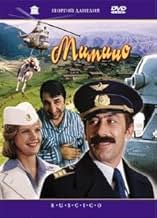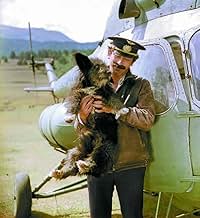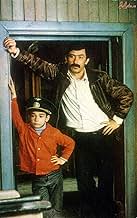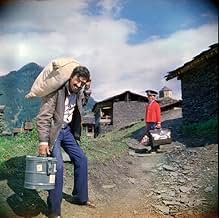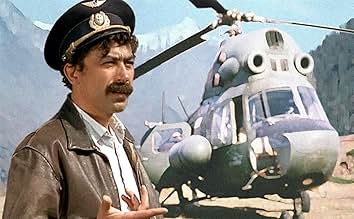Ajouter une intrigue dans votre langueLocal Georgian pilot Mimino dreams of flying airplanes for major international airlines. To realize his aspirations, he goes to Moscow where he encounters a fellow comrade from the Caucasus,... Tout lireLocal Georgian pilot Mimino dreams of flying airplanes for major international airlines. To realize his aspirations, he goes to Moscow where he encounters a fellow comrade from the Caucasus, the Armenian Rubik. Many misadventures ensue.Local Georgian pilot Mimino dreams of flying airplanes for major international airlines. To realize his aspirations, he goes to Moscow where he encounters a fellow comrade from the Caucasus, the Armenian Rubik. Many misadventures ensue.
- Prix
- 1 victoire au total
- Valiko 'Mimino' Mizandari
- (as Buba Kikabidze)
- Grandfather
- (as Konstantin Daushvili)
- Advocate Svetlana Georgievna
- (as Mariya Dyuzheva)
- Ekaterina 'Kato' Mizandari
- (as Z. Butsvadze)
- Man Weighing Self before the Flight
- (as B.Brondukov)
- Endocrinologist Symposium Organizer
- (as L. Gaziyeva)
Histoire
Le saviez-vous
- AnecdotesThe concept of the film arose when Revaz Gabriadze told Georgiy Daneliya a story about a pilot who lived in Kutaisi (Georgia) and locked his plane to the ground with a chain. However, it was to be screened only years later. The original script of this movie was entitled "Nichevo osobennovo..." ("Nothing Special...") and had an entirely different plot but a friend of Daneliya's, a writer named Maksud Ibragimbekov, remembered the story about the pilot and the chain in a conversation with Daneliya and the latter decided to replace the story literally days before filming. Vakhtang Kikabidze recalled later that most of the film was shot without a script and that during filming, he had an impression that they were fooling around rather than working. The line "Nichevo osobennovo" remained in the film (it was said by Mimino on a plane).
- GaffesWhen Mimino is talking to the old woman besides his helicopter on the plateau the type of the helicopter (riveted to no-riveted body) and the size and shape of the mountains seen in the background change between the shots.
- Citations
Rubik Khachikyan: The truck got stolen.
Valentin Mizandari: What do you mean stolen? Are you sure this is where you parked it?
Rubik Khachikyan: What do you mean am I sure? A woman was smoking next to that garbage bin over there.
Valentin Mizandari: Rubik, stay here, don't let anyone go in or out, get the trails. I'll go get the police.
Rubik Khachikyan: Tell them that the truck got stolen, it was brand new!
- Autres versionsThe premiere version that was shown on the Moscow International Film Festival was cut by the scene in which Valiko is calling an immigrant in Tel Aviv by mistake. The immigration topic was a political issue and the international public wasn't supposed to see it. The festival version was the only cut print (which later has been reportedly destroyed by the director); the theatrical release was uncut.
- ConnexionsFeatured in Namedni 1961-2003: Nasha Era: Namedni 1978 (1997)
- Bandes originalesPrikhodit den, ukhodit den
(uncredited)
Music by Giya Kancheli
Lyrics by Robert Rozhdestvensky
Performed by Vakhtang Kikabidze
Played in the opening credits and the tune is used several times later
In all former Soviet states this film is still loved and admired, so It's pity that non-Russian speaking audience will never get even 10% of its jokes and humor. There are several reasons for this:
1) To understand this (and actually all soviet film) one must not just know the Russian language - one must know the Soviet system, soviet culture, lifestyle.
2) Those who think that Soviet UNION=Russia are very wrong, and here the fact that USSR consisted of 15 different states (and hundreds of nations actually) has a great importance - as the story concerns the "adventures" of two southerners (a Georgian and an Armenian) in Moscow (that was both capital of Russia and USSR)-great deal of humor comes from their accents, as well as cultural differences. The director himself is Georgian who mostly lives in Russia and most of his films concern Russia (almost all of them are very popular in Russia) Only in one film (Ne Goryui!- that is equally as good as this one though very different) the action takes place in Georgia. (other much recommended films are Kin-Dza-Dza and Autumn Marathon..)
3) It is very important to know certain cultural confrontation that existed in USSR and still exists in Russia - Caucasians (Russia is the only v\country where this term means "black, dark person" - i.e. Georgians, Armenians, Azeri, and others) are rather unpopular in Russia (Russian nationalists consider them second main enemy after Jews, now due to Chechnya war Caucasian people became the most unpopular in Russia ); Characters of Georgian And Armenian visually fit the most standard stereotypes that exist in Russia (- big flat hat, moustaches, etc.) Armenians and Georgians for thousands of years had rivalry and competition, each trying to prove that it is older, better, and more cultural than the other;
- AND DESPUITE ALL THIESE Danelia MADE a film where there is no national problem - there are good people and not so good people, friendship and understanding between all these nations win - and therefore the film has a great political-subtexts - though it is delivered so lightly and tenderly that nobody thinks to call it propaganda or political film- its just a CLASSIC SOVIET COMEDY, delicious and funny, not that slapstick-cake-into-face staff, but film about real people, real feelings and real values.
- Irakli28
- 21 nov. 2001
- Lien permanent
Meilleurs choix
- How long is Mimino?Propulsé par Alexa
Détails
Contribuer à cette page


